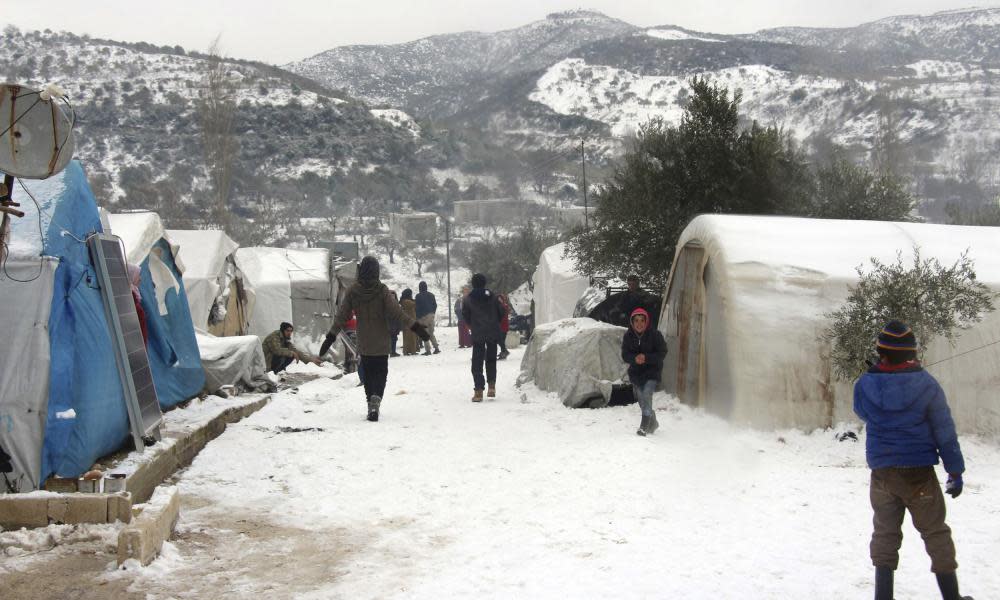Families trapped by Assad’s assault on Idlib fight to survive in the snow

Hundreds of thousands of civilians, many of them women and children, are stranded with little food or shelter in sub-zero temperatures in north-western Syria, forced from their homes by a Russian-backed military offensive that has often targeted hospitals and other civilian infrastructure.
The assault on Idlib, the last stronghold of the Syrian opposition, has created one of the greatest humanitarian crises of a long and brutal war. It has displaced more than 800,000 people since December, the United Nations said, 143,000 of them in the last three days alone.
“It’s like we are living in a graveyard,” said Manar al-Deiry, a teacher sheltering with her children, aged seven and nine, in a tent on a snowy hillside near the border.
She has a makeshift stove but is frightened to use it to heat the tent because the smoke is giving her children breathing problems and some families have suffocated in their sleep.
“The cold is in our bones, we can’t get warm any more,” she said. “But I still see our situation is much better than people who are just living under trees with nothing to protect them from freezing.”
Families have fled towards the border with Turkey, but it is closed. The country already hosts 3.5 million Syrian refugees and will not allow more across.
President Recep Tayyip Erdoğan spoke by phone with his US counterpart Donald Trump on Saturday, . The two men called for an immediate halt to the fighting in Idlib and condemned Syrian government forces’ attacks there, the Turkish leader’s office said.
Like many in Idlib, Deiry had already fled numerous times before reaching her hillside tent, first from her home in Hama and then from two other cities in Idlib. The shrinking rebel-held area is now home to more than three million people, many, like Deiry, refugees several times over. More displaced people were arriving each day, but there was no safe place for them to go, said Mousa al-Zidane of the White Helmets volunteer group. “The situation for people in camps is catastrophic,” Zidane said. “It was heartbreaking yesterday when three people died when trying to light a fire inside their tent to keep their children warm.”
Camps in northern Idlib were already five times over capacity, with shortages of food and water, and could not cope with newcomers. “We see at least four families living in single-family tents,” said Munzer Khalil, an Idlib doctor. “Unclean water is causing an unprecedented high rate of transmitted diseases, hitting the most vulnerable, women and children the hardest.”
Although Turkey is not opening the border, its forces are on the ground in Idlib and are clashing frequently with the Syrian army, moving the two countries closer to an all-out conflict than at any point in the nine-year-old civil war. Erdoğan has threatened a full-scale military intervention if the Syrian offensive does not stop by the end of this month; so far talks with Russian diplomats in Ankara appear to have been inconclusive.
Turkey is seeking to enforce a de-escalation deal for Idlib brokered in 2018 by Moscow, which backs Assad, and Ankara, which supports some rebel groups in the area. The ceasefire has been routinely broken by both sides, but a campaign of attrition by Assad has escalated since Hayat Tahrir al-Sham (HTS), formerly al-Qaida’s Syrian affiliate, seized control of most of the area last year.
Idlib, which has become a refuge of last resort for Turkish-backed rebel forces and jihadists, is the only main Syrian province yet to be recaptured by the regime in Damascus since fighting began in 2011.
The Syrian government’s military campaign over recent weeks has included bombing of heavily populated areas, and civilian infrastructure including hospitals and markets.
In January alone, 53 health facilities have suspended work in Idlib due to bombardment or evacuation and many towns have no healthcare services at all, Khalil said.
Rescue efforts are also complicated by the cold. “It’s becoming very challenging for us to evacuate civilians or go on search and rescue missions in the snow and freezing temperatures but we are doing what we can.”
David Miliband, president of the International Rescue Committee, said global values as well as global security were at stake. “The catastrophe in Idlib is a symptom of the utter failure of diplomacy and abandonment by the international community of Syrian civilians.”
Hussein Akoush contributed to this report

 Yahoo News
Yahoo News 
